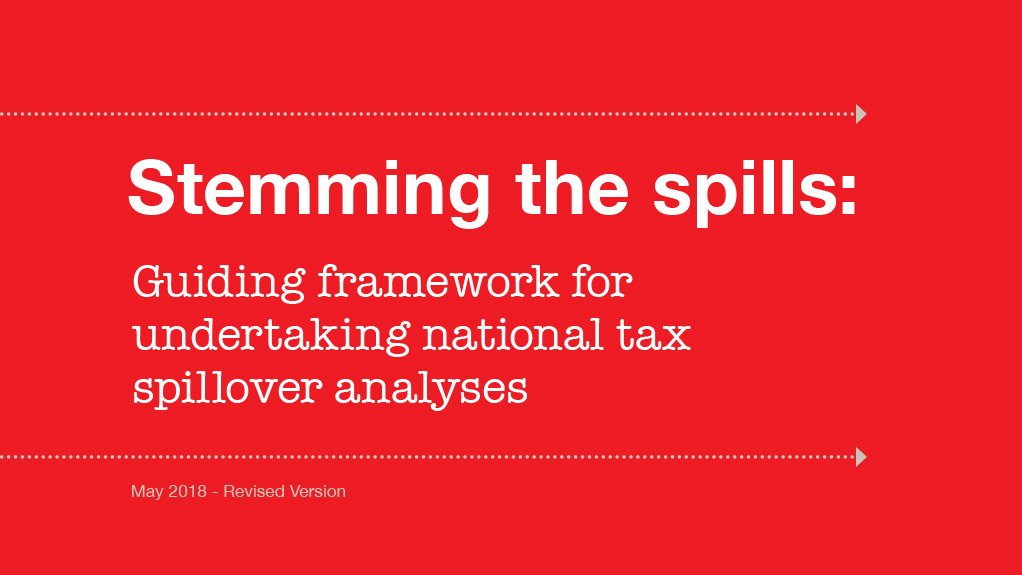- Stemming the spills: Guiding Framework for National Tax Spillover Analyses0.37 MB
The last decade has revealed scandal after scandal exposing how multinational companies use one country’s tax system, or a combination of several countries’ tax systems, to avoid paying tax in a third country. These are examples of tax spillover effects where tax rules and practices in one country directly or indirectly affect tax revenues, rules and practices in other countries.
It is widely recognised by the IMF, the OECD and other institutions that these spillover effects are significant and sizable, and that spillover effects are especially marked and important for developing countries. In short, developing countries suffer relatively more than rich countries from international tax spillover effects which they did not themselves create.
With so much potential revenue lost in developing countries, tax is central to the financing of the 2030 Agenda for Sustainable Development which all EU member states have committed to. Moreover, EU member states have committed to the concept of policy coherence for development (PCD), ensuring that impact on developing countries will be taken into account in all their policies, with taxation as one of the key areas. To make informed policy choices, EU member states need to analyse their tax policies to improve the understanding of their extraterritorial effects. For this reason, a number of actors, including the European Parliament, is calling for EU member states to conduct national tax spillover analyses to honour their international commitments.
ActionAid considers national tax spillover analyses key in achieving fair and responsible tax policies. With this new report we propose a guiding framework for national tax spillover analyses by EU member states and aim at launching a debate on this important topic.
Specifying in advance the precise national mechanisms for spillover effects is difficult due to the country-specific context and dynamic multivariate nature of tax processes. Therefore, instead of presenting an exact model for national tax spillover analyses, this Guiding Framework presents recommendations for what elements future national tax spillover analyses should take into account in terms of method, scope and process.
With regard to methodology it is recommended that a broad qualitative risk assessment of potential spillover effects should guide both an econometric analysis of financial spillover effects and an interpretive analysis of indirect effects and human rights impacts.
With regard to scope and content ActionAid recommends that national tax spillover analyses include all domestic rules and regulations enabling aggressive tax planning. These include ring-fencing structures targeting foreign financial flows and rules directly or indirectly affecting the effective tax rate for corporations. Importantly, positive spillover effects from international cooperation, transparency measures and anti-abuse measures should also be included in future national tax spillover analyses.
Finally, EU member states’ bilateral engagement and engagement abroad should be analysed, including double taxation treaties (DTTs) and the effects of the policies of development finance institutions (DFIs).
With regard to process recommendations ActionAid recommends a design which has an initiation phase and discussion phase involving ministries of Foreign Affairs, Business and Finance (or their equivalents), the administrative departments responsible for taxation, aid and development policies, and the relevant parliamentary committees. These political stakeholders should agree on the intended objectives of the national tax spillover analysis, and they should define the political values guiding the research. And together with representatives from civil society, academia and the business community they should form a multi-stakeholder steering group managing the research including forming the terms of reference (ToR) as well as potentially selecting and hiring an external contractor to do the research. Finally, transparency and public accountability should be ensured in as many steps of a spillover analysis as possible, including public access to working documents of the steering group, drafts and discussions of the research, and the selection and hiring of a contractor.
The report was first published in July 2017 and updated in May 2018.
Report by ActionAid
EMAIL THIS ARTICLE SAVE THIS ARTICLE ARTICLE ENQUIRY
To subscribe email subscriptions@creamermedia.co.za or click here
To advertise email advertising@creamermedia.co.za or click here











